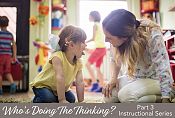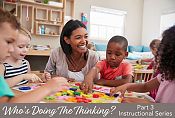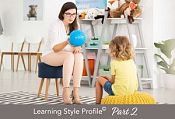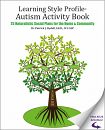How Can Children With Autism Become Less Object-Oriented And More People-Oriented? Strategies To Develop A Social Priority – LSP Part III Instructional Series #e252
Presenter: Patrick Rydell, Ed.D., CCC-SLP
Strategies to help move children with autism from being object-oriented to people-oriented learners.
This course is part of the Learning Style Profile© Training Series. The below 2 courses are suggested prerequisites prior to taking this course.
– K.F., prior course participant
Read more comments about this course!
Does your child have a primary focus and priority on objects, rather than people? Does your child have difficulty “looking up and around” at the available social cues and information in the room to understand how and when to socially participate with others? Does your child see others as interference with their object-oriented learning preferences? Does your child have difficulty seeing others as valuable sources of social information?
These questions characterize and reflect the learning style challenges that many children with autism face in their journey to become good social partners with both adults and peers. This course, based on the Learning Style Profile© (LSP), provides insight to these learning style challenges, and also specific goals and strategies for SLPs to use at home, school, or therapy to help move children with autism from object-oriented to people-oriented learners. These empirically based, practical and common-sense strategies provide a clear intervention roadmap and direction to building a solid people-oriented foundation and learning style for children’s acquisition of advanced social and communication skills. This course is particularly relevant for children with autism who struggle with how to independently learn social skills from others without being directly taught or prompted by adults.
Offered for 0.1 ASHA CEUs – 1 Contact Hour.Course Overview – Run Time: 1:06:08
- Description of the Learning Style Profile© (LSP) for children with ASD.
- Object-oriented learning style challenges.
- People-oriented intervention goals.
- People-oriented intervention strategies.
- Future social-communication benefits for people-oriented learners.
– M.H., prior course participant
Read more comments about this course!
This presentation will focus exclusively on the Learning Style Profile© (LSP). Other treatment approaches will receive limited or no coverage as part of this training. Presenter financial and non-financial disclosures may be found in the Presenter & Disclosures area.
Video PowerPoint presentation with author narration & downloadable handout. Stop and re-start the course at any point. Learners retain access to course content after completion for ongoing reference and review.
Reviews
"Reminder to clear the room of distractions was the best discussion. The handout was helpful and thorough as a step by step guide." V.F. (Jun. 2025)
"Very clear step-by-step instructions. I enjoyed the organizational format of this course - carry out in steps." L.M. (May 2025)
"Going over how therapists need to set the stage and invite children in was most helpful. I liked how Dr. Rydell explained the learning style profile and where and how to implement with goals and strategies." A.B. (May 2025)
"The Learning Style Profile itself was most beneficial. I liked that this course gives information for some issues I have had with my cases." D.T. (Apr. 2025)
"I liked the set up of this presentation. I liked not focusing on eye contact." K.M. (Apr. 2025)
"Working with children with ASD, I appreciate always learning new techniques. I found Dr. Rydell's 10 steps very simple and concise for increasing people-oriented attention. Dr. Rydell's style of teaching with quick, easy-to-follow guidelines and straight forward approach is great for learning a new skill within a busy lifestyle." S.O. (Mar. 2025)
"The suggestions of how to initiate services and not focusing on eye contact were helpful. I liked that the course was very easy to follow and the information will be helpful." A.A. (Mar. 2025)
"Moving slow, presenting children with "new information" rather than relying on correct responding. I like how the course was broken down into 10 pieces of information." K.C. (Mar. 2025)
"I liked the discussion that it's important to talk less, using a soft tone of voice. Short and sweet; the course reemphasized to follow the child's lead at times during play." K.M. (Feb. 2025)
"The LSP and learning steps will be something I review and look into more in the future. I liked the presenter's enthusiasm and easy-to-understand slides." K.R. (Feb. 2025)
"I liked the common sense goals and suggestion for adult behavior." T.D. (Feb. 2025)
"I liked the idea of clearing the room and only presenting one toy at a time. I liked how the course was done in a PowerPoint presentation style." L.K. (Jan. 2025)
"I liked the goals presented and the explanation on how to present one toy at a time and remain in control of the toy. I like the modeling of how to explain to the parents what you are trying to accomplish." L.J. (Dec. 2024)
"The entire concept of people-centered vs object-centered was beneficial. The concept of establishing people-centered learning prior to any "teaching" /language development/requesting/etc. I liked the presentation style with the PP and the instructor visible simultaneously." K.W. (Dec. 2024)
"It was helpful to discuss the importance of slowing down to build social focus/ social curiosity rather than rushing to teach skills. Clearly laid out and presented." L.C. (Dec. 2024)
"Seeing myself as a mentor rather than a teacher. The course was clear, concise, and practical." L.R. (Dec. 2024)
"All of the information was beneficial." M.P. (Dec. 2024)
"The topic around adults providing the toys rather than children choosing was beneficial. I liked the goal ideas for joint attention." K.B. (Aug. 2024)
"Energy is energy and whether it is talking, anxiousness, or big movements all of this can cause dysregulation! I enjoyed the presentation and pace of the material given, the examples provided and the value of the information about joint attention routine (JAR)." A.B. (Jun. 2024)
"The goals section was helpful. I enjoyed the overall discussion on au treatment." C.M. (Jun. 2024)
"All the information was beneficial. The course was practical and well presented." D.D. (Jun. 2024)
"Two of the most beneficial strategies for me were that "the adult sets the stage" and "model and demonstrate." I teach students with moderate to severe autism, and they indeed are so focused on how they want to play with specific toys. These strategies are going to be very helpful in guiding my students to be more people-oriented than object-oriented. I like how the instructor breaks down each strategy to make it easier to understand and implement within my classroom." M.L. (Jun. 2024)
"People orientation vs object orientation was beneficial to discuss. I enjoyed the suggestions." S.S. (May. 2024)
"Good reminder to always 'read the room' when entering, look up and around to gather social cues and information. The course was brief and well organized." S.D. (May. 2024)
"The need to take things slowly and not focus on a correct response is something that I sometimes struggle with. I liked the methodical way he explained the steps and what was expected as an outcome." C.S. (Feb. 2024)
"I appreciated the reminder to help the child focus on us / people, not on toys, their clothing... I liked this focus on us as mentors and guides and the source of new learning and interaction." N.L. (Dec. 2023)
"The clearly stated 10 steps were beneficial. Clear and concise information overall." S.M. (Dec. 2023)
"I liked the step-by-step goals and strategies. Talking slow and slow like molasses not to elevate the situation and dysregulate the child was helpful." J.D. (Nov. 2023)
"All topics were beneficial. I enjoyed the entire course." R.S. (Nov. 2023)
"Well organized and clearly presented course. The importance of helping to provide effective support for a child to view others as social partners." J.H. (Nov. 2023)
"Information was relevant. I liked the specific goals and areas to focus on." A.O. (Sep. 2023)
"Specific, actionable suggestions." A.P. (Aug. 2023)
"Teaching parents to stay focused on what to do with their child was beneficial." S.A. (May 2023)
"I liked the suggested goals for starting with children at this level. Great suggestions and ideas on how to engage children in reciprocal engagement. Liked the practicality and honesty, and the validation in a lot of what I've felt was appropriate and more beneficial for children with ASD." C.I. (May 2023)
"The steps for focusing more on people were beneficial. And I liked the toy demonstrations." K.W. (Apr. 2023)
"I liked the goals for object-oriented learners." L.R. (Mar. 2023)
"The suggested goals and strategies for moving from object to people-oriented goals were/are the most beneficial for daily practice. The strategies that were provided, such as clearing the room, presenting one toy at a time, etc., were what I liked best about this course." L.A. (Feb. 2023)
"The presenter provided strategies that I can implement tomorrow in my practice. He was very knowledgeable about the topic discussed." M.H. (Jan. 2023)
"I liked the quote "this toy comes with me" and teaching the social priority. All of the examples for getting children to engage with people over toys were beneficial and I liked the idea of being a mentor vs. teacher." L.H. (Dec. 2022)
"Reminder to slow down and use a soft, low tone voice and to not feel the need to "entertain" the child. I liked the repetition of ideas and that the presenter offered ideas for goals regarding this stage of social communication." C.G. (Dec. 2022)
"I liked the step-by-step format." M.H. (Dec. 2022)
"I liked clearing the room of toys and distracting items. And less talk to gain attention of autistic students." L.W. (Dec. 2022)
"Dr. Rydell is so easy to follow. He presents his information in such an organized fashion." L.K. (Dec. 2022)
"Quick, specific ideas to share with families and caregivers. Examples and explanations were great." K.F. (Dec. 2022)
"Being a source of information to the child - this changed my thinking about my approach and set-up to therapy sessions." M.E. (Nov. 2022)
"The slides were excellent and I appreciated the presentation with the speaker in the corner of the screen." M.S. (Oct. 2022)
"Setting goals to achieve precisely what needs to be achieved, and reviewing techniques in therapy i.e. setting, materials, etc was helpful." M.S. (Oct. 2022)
"The information on how too much talking and the tone of our voice can make the autistic person withdraw or become anxious was interesting. I liked how we should not give up but continue to Reset and Repeat our activity until we notice a change in the individual. I also liked the handout." R.F. (Oct. 2022)
"Practical suggestions. I liked everything - especially the emphasis on basic things like tone of voice and physical proximity of therapist and child." A.S. (Oct. 2022)
"I LOVE this! This is such a great way to build trust and rapport and COMMUNICATION." D.J. (Sept. 2022)
"I liked the concept of clearing the room, and that I was able to see and hear the presenter." E.J. (Sept. 2022)
"The information was presented in a simple, easy format to follow." E.J. (Sept. 2022)
"Clear and specific strategies to help kids become more people oriented." A.G. (Aug. 2022)
"Course was easy to process and follow along with. I liked the basic principals of attention and methods to aid in increased directed and focused attention." A.R. (July 2022)
"I appreciated learning about the differentiation between the vital role of mentoring verses teaching skills especially during the early stages of intervention." A.M. (June 2022)
"I felt the biggest takeaway was that our models do not need to have a verbal component." R.H. (June 2022)
"Strategies are easy to use. I liked the use of slow and deliberate actions and speech." E.R. (June 2022)
"I liked the practical steps for the environment and manner to approach the student. I enjoyed the content and how the presenter paced the course as well as brought in real life examples." D.A. (May 2022)
"I liked the idea of not chasing, enticing children to come to you and view you as a source of information. Handouts will be great reminders of key points, especially when teaching assistants and parents." A.R. (Apr. 2022)
"I liked the breakdown of object vs people oriented with examples – great explanations." D.P. (Apr. 2022)
"Valuable information specifically on helping children become more people-oriented." V.A. (Mar. 2022)
"I appreciated the clear strategies for implementing this approach. To have a concrete guide for how to go about this was helpful. And the emphasis on the importance of establishing joint attention, which is so critical for working with this population. I also appreciated that the presenter provided some ideas of goals that could be relevant to this process." M.H. (Mar. 2022)
"I was interested in hearing about the importance of low energy levels. The slides were helpful in following along." J.R. (Mar. 2022)
"I loved the step-by-step hierarchy of achieving this, most vital, goal for children with ASD." M.F. (Feb. 2022)
"I appreciated the simple break downs presented. Great slide information to support speaker's focus." A.K. (Feb. 2022)
"Clearing the room, simplifying and not talking. As an SLP, I've been preaching 'not talking' to colleagues for many years - it's nice to have back-up!" E.M. (Jan. 2022)
"I will be more conscious of clearing the space of additional toys and stimuli and prompting less. The instructor was pleasant to listen to and covered the points in the outlines and goals presented in the beginning of the session." K.M. (Jan. 2022)
"All of the topics presented in the course were beneficial for my daily practice." A.M. (Jan. 2022)
Course Objectives
- Describe the learning style challenges children with autism face when moving from object-oriented to people-oriented learners.
- Identify this course’s 10 strategies in the "people-oriented" intervention process.
- Describe the future benefits for children with autism of developing a "people-oriented" learning style.
Presenter & Disclosures

Patrick J. Rydell, Ed.D., CCC-SLP, is the Founder and Director of the Rocky Mountain Autism Center, Inc. and Autism On Call, LLC, in Lone Tree, Colorado. With more than 38 years of practice (“on the floor”) in the field of Autism Spectrum Disorder (ASD), he has provided international and national trainings, workshops, consultations and program development to governmental agencies, medical facilities, universities, school districts, professionals and families. His doctorate was earned through a National Institute of Health Leadership in Autism grant (1989) and he has a double master’s degree in speech pathology and special education with a program emphasis in early childhood and autism spectrum disorder. Dr. Rydell is a U.S. Fulbright Senior Specialist Grant recipient (2005). Dr. Rydell is the co-author of the SCERTS Model (Prizant, Wetherby, Rubin, Laurent & Rydell, 2006) and author of the Learning Style Profile for Children with Autism Spectrum Disorder (Rydell, 2012) and Autism On Call Educational Series (Vimeo, 2017). Dr. Rydell has also co-authored 5 book chapters and numerous peer-reviewed research articles on topics related to autism spectrum disorders. He is currently developing ASD programs across Asia, Central Asia, and South America based on the LSP approach.
Speaker Disclosures:
Financial — Patrick Rydell is a presenter of online CE courses sponsored by Northern Speech Services; receives royalty payments.
Financial — Patrick Rydell is the author of Learning Style Profile Autism Activity Book; receives royalty payments.
Financial — Patrick Rydell is the author of Learning Style Profile for Children with Autism Spectrum Disorder, published by Rocky Mountain Autism Center (January 21, 2013); receives royalty payments.
Nonfinancial — Patrick Rydell has no relevant nonfinancial relationships to disclosure.
Intended Audience / Accreditation

This program is offered for 0.1 ASHA CEUs (Intermediate Level; Professional Area).

Intended Audience
- Speech-Language Pathologists
ASHA CEUs:
Northern Speech online courses are registered with ASHA and are offered for ASHA CEUs. The number of ASHA CEUs is noted above. Note that 0.1 ASHA CEU = 1 contact hour = equals 1 CEE.
Earning ASHA CEUs and the ASHA CE Registry:
To earn CEUs from this course and have ASHA CEUs submitted to the ASHA CE Registry, course participants must satisfy each of these requirements:
- Participants must meet the eligibility requirements to earn ASHA CEUs (see below).
- Participants must indicate – prior to course completion – their intent for Northern Speech to submit this course to ASHA.
- Participants must complete/view this course in its entirety.
- Participants must complete the course post test with a minimum of 80% accuracy.
- After successful completion of the post test and completion of the course evaluation, a certificate of course completion is presented to the participant electronically via PDF.
- For those participants who indicated their intent for the ASHA CE Registry, course completion status will be submitted by Northern Speech to ASHA within 45 days of the course completion date.
Eligibility To Earn ASHA CEUs:
Attendees must meet at least one of the following conditions in order to be eligible to earn ASHA CEUs:
- Current ASHA Member.
- ASHA Certificate of Clinical Competence (CCC) Holder.
- Licensed by a state or provincial regulatory agency to practice speech-language pathology (SLP) or audiology.
- Credentialed by a state regulatory agency to practice SLP or audiology.
- Credentialed by a national regulatory agency to practice SLP or audiology.
- Engaged in a Clinical Fellowship under the supervision of an individual with their ASHA CCC.
- Currently enrolled in a master's or doctoral program in SLP or audiology.
If an attendee is not an ASHA member or CCC holder but meets any of the above criteria, they may inform the ASHA CE Registry of their eligibility by visiting this site.
ASHA CE Registry:
During the enrollment process, if you select to receive ASHA credit for this course and if you provide your ASHA number, Northern Speech will automatically submit your CEU information to the ASHA CE Registry after successful course completion (80% on post test). This submission happens once per month, during the first week of the month. For example, if you complete your course on November 7th, Northern Speech will submit all November online course CEUs to ASHA during the first week of December. When ASHA inputs the information into their database, they will mark the course as completed on the last day of the month in which it was completed, so November 30th using this example. The certificate of completion available for you to print immediately, however, will reflect the actual completion date, November 7th in this example. Due to ASHA processing procedures please allow 2-3 weeks, from the submission date, for the course to appear on your ASHA transcript.
Licensing Boards: Most state licensing boards DO accept CEUs earned online (usually classified as home-study credits). Some state boards do, however, place a limit to the number of credits that can be earned via home study/online courses. For the most current information, we suggest that you contact your licensing board or agency to verify acceptance policies and/or any credit limits related to home-study courses prior to registering for this course.
Additional accrediting agencies by which Northern Speech is an approved CE provider:
- California: NSS is approved as a provider of continuing education by the California Speech-Language Pathology & Audiology Board. Provider #PDP4. Online CEU limits may apply; please contact SLPAHADB for current online CEU acceptance policies.
- Iowa: NSS is approved as a provider of continuing education by the Iowa Board of Speech Pathology and Audiology Examiners. Provider #169.
- Kansas: NSS is approved as a provider of continuing education by the Kansas Department of Health and Environment. Provider #LTS-S0005.
- Florida: NSS is approved as a provider of continuing education by the Florida Speech-Language Pathology and Audiology Board. Provider #SPA-026.
- New Jersey: NSS is approved as a provider of continuing education by the New Jersey Department of Education. Provider #1654.
Frequently Asked Questions
Customer Support: Please phone 888.337.3866 or email info@northernspeech.com.
Course Completion Timeframe:
You have unlimited time to complete our online courses. You may log off and log on as often as you’d like to in order to complete all sections of a course.
However, completion dates are based on Eastern Standard Time. Therefore, if you need your CEUs by a certain date, be sure to complete the course test before 11:59pm EST on that date. For example, if you need CEUs before January 1st, you will need to complete the course test before 11:59pm EST on December 31st.
Content Access:
Access to course materials and content does not expire, even after completing the post test. You may continue to review course material by logging into your NSS account, clicking the My Online Courses tab, and then viewing your desired course.
Certificate of Completion:
On successful completion of the post test (80%), a certificate will be immediately available for download and/or printing. This certificate will include your name, date of completion (based on Eastern Time Zone, USA/Canada), and number of contact hours (CEUs / CEEs). Please note that CEUs are awarded on the date of successful test completion, not the date of course enrollment. Please ensure that you successfully complete the post test prior to any licensure renewal dates.
ASHA CE Registry Submission:
During the enrollment process, if you select to receive ASHA credit for this course and if you provide your ASHA number, NSS will automatically submit your CEU information to the ASHA CE Registry after successful course completion (80% on post test). This submission happens once per month, during the first week of the month. For example, if you complete your course on November 7th, NSS will submit all November online course CEUs to ASHA during the first week of December. When ASHA inputs the information into their database, they will mark the course as completed on the last day of the month in which it was completed, so November 30th using this example. The certificate of completion available for you to print immediately, however, will reflect the actual completion date, November 7th in this example. Due to ASHA processing procedures please allow 2-3 weeks, from the submission date, for the course to appear on your ASHA transcript.
Purchase Orders:
Purchase orders are currently not accepted for online orders, if you wish to submit a purchase order please do so at info@northernspeech.com or fax to 888-696-9655.
What is an Online Course?
Our Online Courses consist of video, audio, and/or text content and are offered for ASHA CEUs. Unlike a webinar, which requires participants to be logged on and at a computer at specific times, our Online Courses are available to you at any time, from any device, via your NorthernSpeech.com online account. You may work at your own pace and start and stop your course as you wish. Your course will conclude with a short post test. On successful completion of the post test (>80%), a printable certificate of completion is presented to you.
Receiving CEUs:
Northern Speech is an ASHA CE Provider and our online courses are registered with ASHA and offered for ASHA CEUs. Please note that successful completion of the online post test is required prior to the awarding of CEUs. Please contact your state licensing board for acceptance policies related to CEUs earned online. Please note that courses offered for university students are not applicable for CEUs.
Registering for an online course:
You may browse all online courses by clicking the Continuing Education tab above, then Online Courses. Once you find a course, click Enroll Now, and you will be asked to either log into your existing Northern Speech account or create a new online account. Once you’ve entered your account information and provided your credit card payment, your course will be immediately available to you.
Accessing your purchased course or returning to a purchased course:
You will be able to access your online course by logging into your Northern Speech account and then clicking the My Online Courses tab on your profile screen. Click the course you would like to start or to resume. From there, proceed through the course sections until you are ready to complete the post test. You do not have to complete your course all at once. You may log on and off as you wish.
Testing requirements:
Each online course concludes with a post test consisting of multiple choice or true & false questions. Scores of 80% or greater are required for successful course completion and awarding of CEUs. You may revisit course materials and retest as needed to achieve a passing score.
Number of CEUs offered:
We offer courses from 1 to 21 contact hours. Each course will note the number of CEUs offered. Please note that 0.1 CEU = 1 contact hour = 1 CEE.
State licensing boards and online CEUs:
NSS is an ASHA CE Provider and most state licensing boards DO accept ASHA CEUs earned online (usually classified as home-study credits). Some boards do, however, place a limit to the number of CEUs that can be earned via home study/online courses. For the most current information, we suggest that you contact your licensing board or agency to verify acceptance policies and/or any CEU limits related to home-study courses prior to enrolling in an online course.
Course formats:
Our course formats include: text, audio, video, and PowerPoint with author narration. Each course will note the format on the course description page. Most courses include closed captioning.
Course handouts:
Most of our online courses provide a link to download the accompanying handout as a PDF file.
Group discounts:
Groups of 3 or more are eligible for a 20% discount on each registration on most of our online courses. To receive this discount, registrations need to be processed together via the "Group Rates" tab on the Online Course of your choice.
Computer requirements:
For our online courses to function best, we recommend that you update your computer to include the newest version of your Internet browser (Safari, Chrome, Firefox, Edge, Internet Explorer, etc.) and newest version of your computer's operating system. Also a high-speed Internet connection is recommended (cable or DSL). Speakers or headphones will be required for many of our courses as many contain audio components.
Course Cancellation Policy:
A purchased online course can be exchanged, refunded, or transferred to another individual if contact is made with NSS (via phone or email) within 30 days of purchase and the course materials have not been viewed or downloaded.
Special Needs:
Please click here for any special needs requests, and we will do our best to accommodate them.
| Contact Us |









